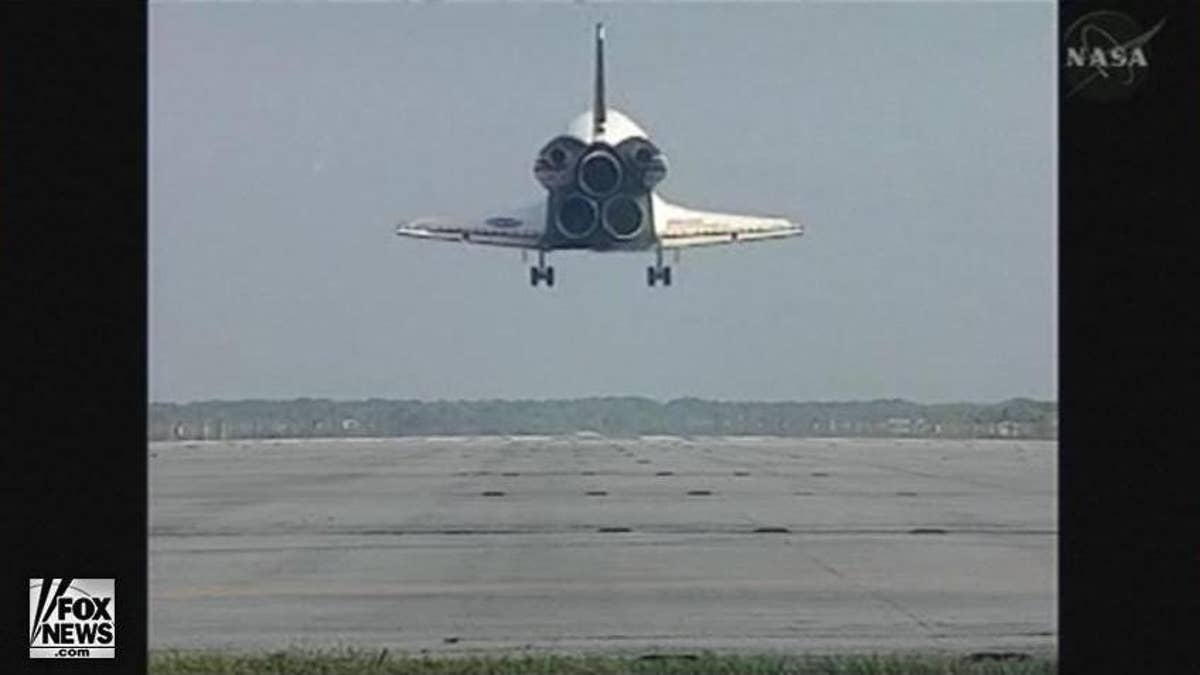
With a smooth touchdown and a safe parachute deployment, Discovery and its seven astronauts landed at the Kennedy Space Center in Florida at 9:08 a.m., where clear skies rather than ground fog greeted the astronaut crew.
The shuttle flew 6,232,235 miles in 238 orbits around the Earth before landing safely in Florida. It was the 129th safe landing for the craft.
Discovery took take a more westerly approach in its descent, bringing the shuttle over Vancouver, British Columbia, and down over Helena, Mont., Wyoming, southwestern Nebraska, northeastern Colorado, southwestern Kansas, Oklahoma, Arkansas, Mississippi, Alabama, Georgia and Florida just east of Gainesville.
It was the first time since 2007 that a space shuttle has descended over so much of the United States. The ship's descent was 20 times steeper than that of a commercial plane landing.
"Sounds like a great ground track," Discovery's commander, Alan Poindexter, had radioed back to ground control.
NASA typically prefers bringing a shuttle home from the southwest. That way, there's minimal flying over heavily populated areas. In 2003, space shuttle Columbia shattered over Texas during re-entry, but no one on the ground was injured by the falling wreckage.
NASA also prefers to end a shuttle flight at its home base in Florida, to save the $1.8 million and minimum of a week it takes to haul a shuttle cross-country atop a modified jumbo jet.
While reentering the atmosphere, Discovery hit speeds as fast as 11,000 mph. It landed at 205 mph at 9:08 and 35 seconds EST, following sonic booms at 9:05 a.m. that announced that the ship was slowing to landing speeds.
Showers that NASA was concerned with have begun to move further East, out into the Atlantic, past the 30-mile zone the space agency is concerned with.
On Monday, rain and overcast skies at Kennedy prevented Discovery from ending its next-to-last flight, a resupply mission to the International Space Station that spanned more than 6 million miles.
Before leaving the space station Saturday, Poindexter and his crew dropped off tons of supplies and equipment. The main delivery was a tank full of ammonia coolant, which took three spacewalks to hook up.
A nitrogen pressure valve refused to open after the tank was installed, and for a day, NASA considered sending the shuttle astronauts out on a fourth spacewalk to fix the problem. But engineers concluded it was not an emergency and that the space station crew or future shuttle fliers could deal with it.
History, meanwhile, was made with the presence of four women in space: three on the shuttle and one at the station.
Only three shuttle missions remain for NASA before the fleet is retired this fall after nearly 30 years of operation. Atlantis will carry up a small Russian lab and other equipment next month.
The same bad weather that prevented Discovery from returning home Monday also stalled Atlantis' trip to the launch pad. The three-mile move from the hangar has been rescheduled for Tuesday night. Liftoff is targeted for May 14.
The Associated Press contributed to this story.








































